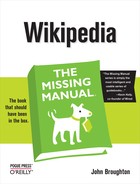As an editor at Wikipedia, virtually every page where a discussion is going on is open for you to add comments. Even with Arbitration Committee cases, the most formal process within Wikipedia, outside comments are accepted at certain points. Thus, you can interact with and help other editors just about anywhere you want: talk pages for guideline and help pages; discussion areas like the Village Pump (see below); or pages like RfCs (???)where editors come specifically for assistance.
The pages mentioned in this chapter have probably given you at least one option that fits your skills and desire to help. But if you’re still looking for more places where lots of discussion’s going on, where editors are asking questions and requesting input, here are more pages that might interest you:
Wikipedia:Village pump (policy) (shortcut: WP:VPP). Discussion of existing and proposed policies and guidelines.
Wikipedia:Village pump (proposals) (shortcut: WP:VP/PR). Discussion of new ideas and proposals that are not policy related.
Wikipedia:Administrators’ noticeboard/Incidents (shortcut: WP:AN/I). Reporting and discussing incidents on English Wikipedia that require administrator intervention.
Non-administrators are welcome to comment, but don’t post something here simply to see your words in print. You must move the discussion forward by bringing new information.
Wikipedia:Conflict of interest/Noticeboard (shortcut: WP:COI/N). Discussions of Wikipedia’s conflict-of-interest guideline and its application to incidents and situations where editors may have close personal or business connections with article topics.
As with editing articles, it’s up to you to decide where your time—for reading, researching, analyzing, and composing a reply—is best spent. Here are some points to consider:
If you absolutely know the answer, or can find it quickly, go ahead and answer, so that other editors who aren’t as knowledgeable can work on other things.
If requests for help on one page are being answered promptly and correctly by other editors, look around for other places with a backlog. That way, you can be assured that you’re not getting into a game of musical chairs with other editors helping out. Similarly, if you can help with an older, unclosed case or question, others who assist at that page will be appreciative.
It’s better to be slow in responding and correct when you do respond than to be the first to provide an answer and to be partly wrong. And if you can’t figure out a good answer, don’t answer at all. If you’ve promised to answer and can’t, just apologize and withdraw gracefully.
Helping others can be a stress-reducer. Editing articles often involves changing other people’s work, and having your own work changed by others. But for relatively stress-free advice-giving, remember that your job is to offer good suggestions, not to assume responsibility for their being accepted. Nor should you expect that you’ll always be thanked for what you did, but if you’re civil and constructive in your comments, your help will be appreciated.
Most importantly, if you find you’re doing things at Wikipedia that you don’t enjoy, stop. Do something else that you do enjoy and let other editors take over what you were previously doing. As the t-shirt says, life is too short to drink bad wine. You can see from this book’s table of contents that Wikipedia is a big place. No matter what you work on, you’re making a difference, and you might as well enjoy it. If you can help editors seeking assistance, great. But if you start feeling overwhelmed, irritated, or bored, that’s a sign that you should spend your time and effort on other things.
